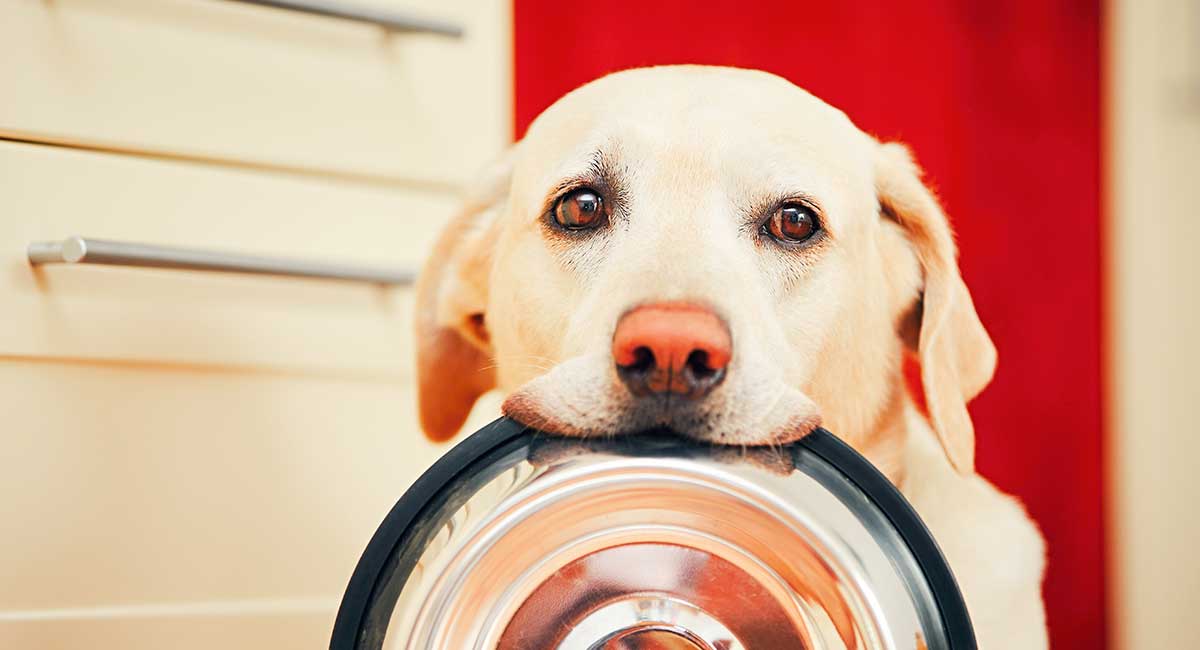
Dogs with polyphagia are generally described as having a ravenous appetite. Regrettably not treating Cushings Disease could precipitate the others.

Crying or whining - If your dog has recently started a new medication or his dose was increased consider hunger as the cause of excessive crying or whining.
Excessive hunger dog. Hyperthyroidism is rare in dogs but it can happen. Excessive levels of the thyroid hormone push your dogs metabolism into overdrive keeping your dog constantly hungry. Other symptoms of hyperthyroidism can include.
Increased thirst and urination. Yes a dogs growing appetite may be due to his canine biology. When a dog increases his food intake to the extent of ravenousness though the condition is referred to as polyphagia.
Excessive eating or swallowing. Causes of Increased Appetite in Dogs. Increased appetite or polyphagia can be brought on by various circumstances.
Increased appetite is known as polyphagia in veterinary terms. If your dog seems to be continuously hungry and his behavior dictates that he requires food in excess of the norm further investigation is warranted. This is especially true if the appetite has recently increased.
Howdy bossie As the others have said get your dog to a veterinarian. There can be several reasons for your dogs excessive hunger polyphagia from just being old to some serious causes. If your dog is continuously begging for food and seems hungry even when he has been recently fed he should be seen by a veterinarian.
The excessive appetite may be a symptom of a serious underlying condition. An increase in hunger may be accompanied by an increase in thirst. Weight can be gained or lost despite the hunger.
Overview of Increased Food Consumption in Dogs. Polyphagia is the term used for an increased consumption of food. Dogs with polyphagia are generally described as having a ravenous appetite.
It is important to differentiate polyphagia caused by a diseased state from that caused by psychological reasons. One reason your pet may have a sudden decrease in appetite may be due to an obstruction or blockage in the intestinal tract. While this occurs more commonly in dogs which are more likely to eat a foreign object than cats this can occur in senior pets who generally have senses that are not as sharp and may eat a foreign object by accident.
The dog seems healthy EXCEPT her Appetite is almost obsessive and her thirst is double or more what it usually is. Even at 12 lbs shell drink steadily for at least a full minute. The excessive hungerthirst could be diabetes even with the elevated liver enzymes.
But if all her other levels were normal then that would be ruled out. How to relieve excessive hunger for dog on phenobarbital Post by Ravens mom Wed Sep 19 2012 733 pm Ravens ravenous hunger tapered off but it took several months- it was the last side effect to disappear. Many conditions can lead to excessive thirst or dehydration in your dog including diabetes Cushings disease cancer diarrhea fever infection kidney disease and liver disease Sometimes however it may not be the condition itself causing your dogs excessive thirst but the medication used to treat it.
Do dogs feel hungry. As they age your dog may act hungrier due to health issues. Benson also mentions that an always hungry dog could have a medical problem causing them to always feel hungry.
While some dogs just simply like to indulge in food sometimes an increased appetite is the sign of an underlying health issue he explains. Excessive water consumption formally known as polydipsia is usually accompanied by polyuria or excessive urination. Constant hunger in a well-fed dog is called polyphagia.
Both symptoms separately result from various conditions but a dog exhibiting polydipsia and polyphagia is often diagnosed with either Cushings disease or diabetes. Examples include restlessness panting increased thirst and looking hunger. Some animals actually become quiet and sleepy.
Others can appear blind and bump into objects or seem fearful and growl or bite when approached. This postictal period can last from several minutes to 24 hours. Crying or whining - If your dog has recently started a new medication or his dose was increased consider hunger as the cause of excessive crying or whining.
Although most vets warn us that the medications can cause excessive hunger many times they dont stress how bad it. Symptoms to Watch for In Your Dog. A healthy appetite is considered a sign of a healthy dog.
As a general rule it is. A dog that is ill is likely to eat less become finicky about their food or stop eating altogether. Even a ravenous appetite can be normal depending on the dog and their activity level.
Excessive thirst and frequent urination are signs of five serious dog health problems. Diabetes kidney failure liver disease leptospirosis and Cushings Disease. Regrettably not treating Cushings Disease could precipitate the others.